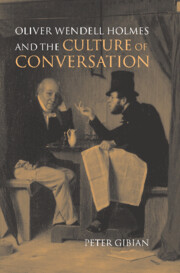It is not easy, at the best, for two persons talking together to make the most of each other's thoughts, there are so many of them.
[The company looked as if they wanted an explanation.]
When John and Thomas, for instance, are talking together, it is natural enough that among the six there should be more or less confusion and misapprehension.
Holmes, The Autocrat of the Breakfast-TableIn the field of psychology, too, Holmes began with French models only to go beyond them. But here, even more clearly than in his purely medical pursuits, the Doctor was always working dialogically on both sides of the issues, speaking on both sides of the arguments as they developed in a fast-changing discipline.
First, the Doctor would of course lend his voice to support what historians now describe as the “first great psychiatric revolution,” inspired in France by Philippe Pinel, who, as administrator of hospitals for the Revolutionary government, in an early version of the clinical revolt, was said to have set madmen free of their chains, and thus set in motion an international process through which madhouses became asylums, madmen became mental patients, and mad-doctors became psychiatrists. Perhaps because Americans had been introduced early on to the work of an English advocate for such reforms, the Quaker Samuel Tuke, this change met little opposition on this side of the Atlantic.
